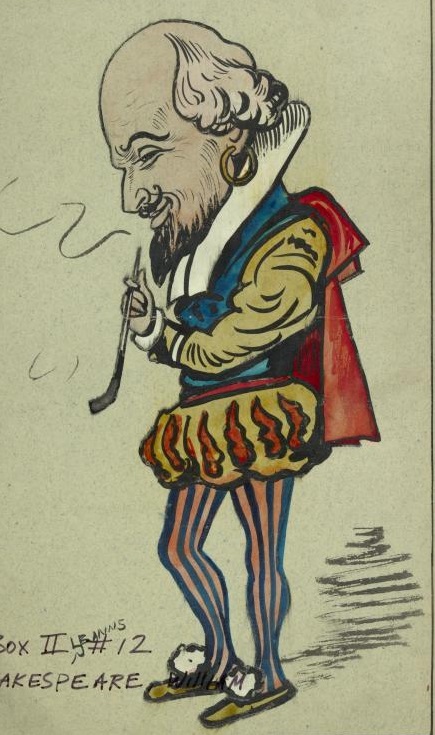Richard III
Please see the bottom of this page for full explanatory notes.
| ACT V SCENE II | Plain near Tamworth. | |
| | Enter, with drum and colors, RICHMOND, OXFORD, BLUNT, HERBERT, and others, with forces marching. | |
| RICHMOND | Fellows in arms, and my most loving friends, | |
| | Bruis'd underneath the yoke of tyranny, | |
| | Thus far into the bowels of the land | |
| | Have we march'd on without impediment; |
| | And here receive we from our father Stanley | |
| | Lines of fair comfort and encouragement. | |
| | The wretched, bloody, and usurping boar, | |
| | That spoil'd your summer fields and fruitful vines, | |
| | Swills your warm blood like wash, and makes his trough | 10 |
| | In your embowell'd bosoms, this foul swine | |
| | Lies now even in the centre of this isle, | |
| | Near to the town of Leicester, as we learn | |
| | From Tamworth thither is but one day's march. | |
| | In God's name, cheerly on, courageous friends, |
| | To reap the harvest of perpetual peace | |
| | By this one bloody trial of sharp war. | |
| OXFORD | Every man's conscience is a thousand swords, | |
| | To fight against that bloody homicide. | |
| HERBERT | I doubt not but his friends will fly to us. | 20 |
| BLUNT | He hath no friends but who are friends for fear. | |
| | Which in his greatest need will shrink from him. | |
| RICHMOND | All for our vantage. Then, in God's name, march: | |
| | True hope is swift, and flies with swallow's wings: | |
| | Kings it makes gods, and meaner creatures kings. |
| | [ Exeunt. | |
Richard III, Act 5, Scene 3
_______
Explanatory Notes for Act 5, Scene 2
From King Richard III. Ed. Brainerd Kellogg. New York: Clark & Maynard.
Abbreviations. — A.-S. = Anglo-Saxon: M.E. = Middle
English (from the 13th to the 15th century) ; Fr. = French ;
Ger. = German ; Gr. = Greek ; Cf. = compare (Lat. confer) ;
Abbott refers to the excellent Shakespearean Grammar of Dr.
Abbott; Schmidt, to Dr. Schmidt's invaluable Shakespeare Lexicon.
____
2. Bruis'd, crushed.
7. Boar. Richard, from his cognizance.
10. Swills, greedily drinks. Wash, the drink given to hogs from washed dishes.
11. Tamworth is about fifteen miles from Bosworth.
21. Dearest need, greatest need.
How to cite the explanatory notes:
Shakespeare, William. Richard III. Ed. Brainerd Kellogg. New York: Clark & Maynard, 1886. Shakespeare Online. 20 Feb. 2014. < http://www.shakespeare-online.com/plays/richardiii_5_2.html >.
|
Notes on Shakespeare...
 Richard Shakespeare, Shakespeare's paternal grandfather, was a farmer in the small village of Snitterfield, located four miles from Stratford. Records show that Richard worked on several different farms which he leased from various landowners. Coincidentally, Richard leased land from Robert Arden, Shakespeare's maternal grandfather. Read on...
Richard Shakespeare, Shakespeare's paternal grandfather, was a farmer in the small village of Snitterfield, located four miles from Stratford. Records show that Richard worked on several different farms which he leased from various landowners. Coincidentally, Richard leased land from Robert Arden, Shakespeare's maternal grandfather. Read on...
____
Shakespeare acquired substantial wealth thanks to his acting and writing abilities, and his shares in London theatres. The going rate was £10 per play at the turn of the sixteenth century. So how much money did Shakespeare make? Read on...
Henry Bolingbroke, the eldest son of John of Gaunt and the grandson of King Edward III, was born on April 3, 1367. Henry usurped the throne from the ineffectual King Richard II in 1399, and thus became King Henry IV, the first of the three kings of the House of Lancaster. Read on...
____
Known to the Elizabethans as ague, Malaria was a common malady spread by the mosquitoes in the marshy Thames. The swampy theatre district of Southwark was always at risk. King James I had it; so too did Shakespeare's friend, Michael Drayton. Read on...
____
Shakespeare was familiar with seven foreign languages and often quoted them directly in his plays. His vocabulary was the largest of any writer, at over twenty-four thousand words. Read on...
|
More to Explore
 Richard III: Plot Summary Richard III: Plot Summary
 Richard III: Q & A Richard III: Q & A
 Famous Quotes from Richard III Famous Quotes from Richard III
 Shakespeare's Sources for Richard III Shakespeare's Sources for Richard III
 Why Shakespeare is so Important Why Shakespeare is so Important
 Shakespeare's Language Shakespeare's Language
 Shakespeare's Boss: The Master of Revels Shakespeare's Boss: The Master of Revels
 Shakespeare's Power of Assimilation Shakespeare's Power of Assimilation
 Preface to The First Folio Preface to The First Folio
 Classification of Shakespeare's Work Classification of Shakespeare's Work
 Shakespeare Q & A Shakespeare Q & A
 Shakespeare's Pathos Shakespeare's Pathos
 Shakespeare's Portrayal of Youth Shakespeare's Portrayal of Youth
 Shakespeare on Old Age Shakespeare on Old Age
 Shakespeare's Heroines Shakespeare's Heroines
 Shakespeare's Attention to Details Shakespeare's Attention to Details
 Shakespeare's Portrayals of Sleep Shakespeare's Portrayals of Sleep
|
 Richard Shakespeare, Shakespeare's paternal grandfather, was a farmer in the small village of Snitterfield, located four miles from Stratford. Records show that Richard worked on several different farms which he leased from various landowners. Coincidentally, Richard leased land from Robert Arden, Shakespeare's maternal grandfather.
Richard Shakespeare, Shakespeare's paternal grandfather, was a farmer in the small village of Snitterfield, located four miles from Stratford. Records show that Richard worked on several different farms which he leased from various landowners. Coincidentally, Richard leased land from Robert Arden, Shakespeare's maternal grandfather.